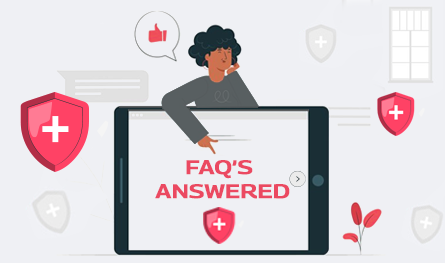Related Articles
 Jan 08, 2025
Jan 08, 2025
Is Varicose Vein surgery covered under the health insurance policy in India
 Health Insurance
Health Insurance

Health insurance has become a household name in recent years, especially after the worldwide pandemic outbreak. People have understood the importance of having health insurance the hard way. This has significantly enhanced its popularity.

Although the concept is popular, people still get stuck with the technical jargon. In this article, we will discuss all the common FAQs to make the entire concept more easily understandable.
Here are some of the most popular questions that confuse most.
This type of insurance essentially covers all medical-related expenses. This is basically a mutual contract between the insurer and the insured, which can be an individual or a group of individuals, where the insurer agrees to provide health insurance coverage up to a certain pre-defined limit in exchange for a pre-determined premium, subject to the terms and conditions of the chosen plan.
Not only does it allow coverage for medical costs, but health insurance also offers multiple benefits like cashless hospitalisation, ambulance cost coverage, room rent cover, etc. It protects you from unforeseen medical costs. You can also enjoy tax exemption for premiums paid towards health insurance.
In the case of an individual plan, one plan insures one individual. However, every insured member can avail of the entire value of the sum insured. A family floater plan is an umbrella plan where you need to pay a single premium. It maintains a fixed sum insured amount, which may get exhausted if any family member gets hospitalised and files a claim.
In the case of claim settlement, the insurer usually demands the identity proof of the insured, the health card, all the invoices and bills generated during treatment, etc. For cashless claim settlement, a duly filled-in and signed pre-authorisation form is required to be submitted to the TPA. Apart from these, the respective insurer demands other additional documents depending on specific case scenarios as applicable.
Pre-existing diseases or PEDs are usually covered after the specific waiting period has elapsed. This waiting period varies from one insurer to another. Your policy document specifies it. You must be aware of this clause to avoid any misunderstandings.
During a medical emergency, you may not always get time to check the network hospitals for accessing immediate treatment. Under such circumstances, you have to inform your insurer as soon as possible. You have to collect and file all the bills, receipts, invoices, and other documents without fail. You have to settle the hospital dues out of your pocket during discharge. Within the stipulated tenure, usually 30/45 days, you must file your claim for reimbursement claim.
However, the “cashless everywhere” initiative has been launched, enabling you to avail of cashless facilities even in non-network hospitals. However, please check with your hospital if this facility is available in order to avail cashless facility. For seamless processing of claims, look up network hospitals nearby so that you can get your treatment in any of the network hospitals.
If your plan gets rejected, irrespective of the circumstances, your premium amount gets reimbursed to the original payment source within a few business days from the rejection date. Considering the policies of your chosen insurer, the medical check-up costs might get deducted from the premium amount.
However your policy would not start or renew if the payment is not processed. So, contact the PayBima team or the insurer urgently to get your policy enforced.
Everyone can buy health insurance for themselves as well as their family members. However, the approval of the application depends on the discretion of the insurer concerned. They will consider all the proposed insured individuals' current health status, previous medical history, age, health checkup reports, etc.
Yes, you can do so, but only during plan renewal. You must confirm all the relevant terms from your respective insurer.
This is the technical term for the money that the concerned insurer assures to pay the insured during claim settlement. This is the optimum limit up to which the insurer will cover.

Paybima Team
Paybima is an Indian insurance aggregator on a mission to make insurance simple for people. Paybima is the Digital arm of the already established and trusted Mahindra Insurance Brokers Ltd., a reputed name in the insurance broking industry with 17 years of experience. Paybima promises you the easy-to-access online platform to buy insurance policies, and also extend their unrelented assistance with all your policy related queries and services.
In a country where medical inflation is rising rapidly, securing a comprehensive health coverage plan for the entire family is no longer optional, it is essential. Selecting the right health insurance requires careful evaluation of multiple factors, not just premium costs. A well-chosen plan ensures financial security, access to quality healthcare, and peace of mind during medical emergencies.


Term insurance is an important investment. However, with the availability of so many insurers offering term plans, it becomes difficult to select the best term plan to suit your needs. Buying a term plan needs some consideration and research on the part of the policyholder. In this post, let us discuss the best term insurance providers in India.


Have you ever caught yourself lost in illusions about your daughter's future events, such as her university convocation and first day at work? Her university convocation. When she embarks upon her initial job after graduation will be the day.

.png)
When you sign up for a life insurance policy - whether it’s a traditional term insurance policy or a ULIP – you are not just buying peace of mind. You are also trusting the insurer with your money. So naturally, you would want to know: How is that money being managed? And more importantly, how is it being protected from risky decisions?

.png)
Globally, 20th October marks the day to observe World Osteoporosis Day. Do you know the significance of observing Osteoporosis on a global platform? Do you know how this condition affects people and their lives? Let us find out in this post!
